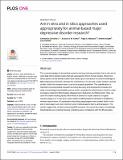Files in this item
Are in vitro and in silico approaches used appropriately for animal-based major depressive disorder research?
Item metadata
| dc.contributor.author | Carvalho, Constança | |
| dc.contributor.author | Varela, Susana A. M. | |
| dc.contributor.author | Marques, Tiago A. | |
| dc.contributor.author | Knight, Andrew | |
| dc.contributor.author | Vicente, Luís | |
| dc.date.accessioned | 2020-06-26T08:30:05Z | |
| dc.date.available | 2020-06-26T08:30:05Z | |
| dc.date.issued | 2020-06-24 | |
| dc.identifier | 268707070 | |
| dc.identifier | 5f26c7e2-638c-45ec-beea-5bedf522d8ad | |
| dc.identifier | 85087098783 | |
| dc.identifier | 000545646600026 | |
| dc.identifier.citation | Carvalho , C , Varela , S A M , Marques , T A , Knight , A & Vicente , L 2020 , ' Are in vitro and in silico approaches used appropriately for animal-based major depressive disorder research? ' , PLoS ONE , vol. 15 , no. 6 , e0233954 . https://doi.org/10.1371/journal.pone.0233954 | en |
| dc.identifier.issn | 1932-6203 | |
| dc.identifier.other | RIS: urn:DCC6FD0D5BCDB3C1038A52539E774222 | |
| dc.identifier.other | ORCID: /0000-0002-2581-1972/work/76386637 | |
| dc.identifier.uri | https://hdl.handle.net/10023/20159 | |
| dc.description | This study was supported by Animalfree Research–Switzerland in the form of funds awarded to CC. Centro de Estatística e Aplicações (CEAUL) provided partial support to TAM, through project funding from Fundação para a Ciência e a Tecnologia, Portugal (FCT) (UID/MAT/00006/2019). The publication fee was financed by Portuguese national funds awarded to LV within the Centro de Filosofia das Ciência da Universidade de Lisboa (CFCUL) research center strategic project, funded by Fundação para a Ciência e a Tecnologia (FCT) (UIDB/00678/2020). | en |
| dc.description.abstract | The current paradigm for biomedical research and drug testing postulates that in vitro and in silico data inform animal studies that will subsequently inform human studies. Recent evidence points out that animal studies have made a poor contribution to current knowledge of Major Depressive Disorder, whereas the contribution of in vitro and in silico studies to animal studies- within this research area- is yet to be properly quantified. This quantification is important since biomedical research and drug discovery and development includes two steps of knowledge transferability and we need to evaluate the effectiveness of both in order to properly implement 3R principles (Replacement, Reduction and Refinement). Here, we used the citation tracking facility within Web of Science to locate citations of original research papers on in vitro and in silico related to MDD published identified in PubMed by relevant search terms. 67 publications describing target papers were located. Both in vitro and in silico papers are more cited by human medical papers than by animal papers. The results suggest that, at least concerning MDD research, the current two steps of knowledge transferability are not being followed, indicating a poor compliance with the 3R principles. | |
| dc.format.extent | 6 | |
| dc.format.extent | 500761 | |
| dc.language.iso | eng | |
| dc.relation.ispartof | PLoS ONE | en |
| dc.subject | QH301 Biology | en |
| dc.subject | DAS | en |
| dc.subject.lcc | QH301 | en |
| dc.title | Are in vitro and in silico approaches used appropriately for animal-based major depressive disorder research? | en |
| dc.type | Journal article | en |
| dc.contributor.institution | University of St Andrews. School of Mathematics and Statistics | en |
| dc.contributor.institution | University of St Andrews. Scottish Oceans Institute | en |
| dc.contributor.institution | University of St Andrews. Centre for Research into Ecological & Environmental Modelling | en |
| dc.identifier.doi | https://doi.org/10.1371/journal.pone.0233954 | |
| dc.description.status | Peer reviewed | en |
This item appears in the following Collection(s)
Items in the St Andrews Research Repository are protected by copyright, with all rights reserved, unless otherwise indicated.

